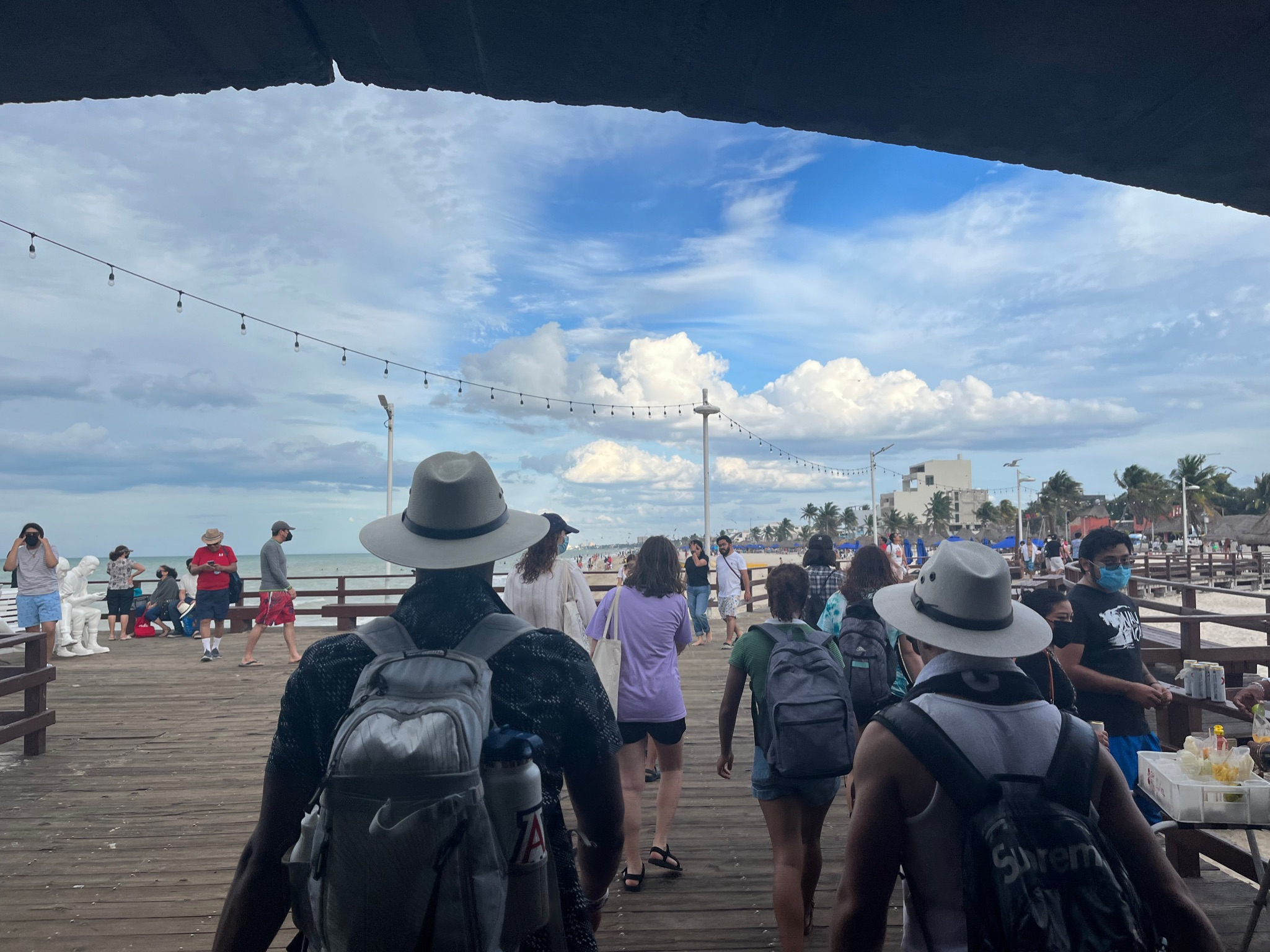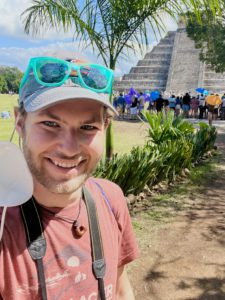How to Organize Independent Travel on a Budget


Looking back on my semester abroad in Mérida, Mexico, one of the things I’m most proud of and would recommend to anyone is to organize some trips by yourself to places you want to explore nearby. My travels to nearby towns and states were both unforgettable travel opportunities and a big area of personal growth for me — I have become more independent and confident navigating the world as an adult over the past five months.
Planning your own trips can be a bit intimidating, but is well worth it, so here are some tips to get you started.
1. Where to study abroad
If independent travel and exploring the region is important to you, it can really help to study somewhere where your money carries you further — for example, it’s a lot cheaper to rent an AirBnB for the night in Mexico than in Europe. (Here in Mérida, there are AirBnBs for $15/night!)
Obviously, independent travel is feasible anywhere, but this is one factor to consider.
2. Get input
When thinking about traveling independently, I asked my host dad what places he’d recommend visiting. He had some suggestions from previous students, as well. The IFSA office had helpful travel recommendations, and Tania González, our Student Experience Coordinator, recommended worthwhile Mayan sites nearby. When we went to Mexico City, the IFSA staff gave us safety advice. I’d also recommend asking other IFSA students since they’ve also probably done some research too.
When picking a location, I’d suggest staying in the local region. It’s a lot cheaper to travel by bus, and staying nearby will give you more context about your host city. My favorite travels were less than a three-hour drive (like Campeche), and many were day trips with just a 40-minute commute (like the nearby town Homun).
3. Set a budget
While I’ll outline how I spent as little as possible on travel, the obvious risk is getting stuck with unplanned expenses. Try to get an idea (from IFSA staff and your host parents) of how much to expect to spend on things like food and transit. This will help you get a better idea of how much you should be paying and help you avoid getting sucked into tourist traps.
4. Go with friends
When studying abroad you’re on an accelerated timetable to get to know other students, and travel is a great way to do that. It also means having someone else to help with the planning and keep you safe; I was able to rely on my friends who had more experience than I do with planning travel.
One thing to note is that it’s harder to organize big groups, so I personally wouldn’t recommend traveling with the whole program. As a rough number, I would say to prepare for a lot more logistical work if you travel with more than 6 people.
5. Look at public transportation
Compared to air travel, bus travel was relatively cheap — our first trip to the nearby city of Valladolid was just $11 each way through the ADO bus company. There were even cheaper third-class bus options through the company MAYAB that we found out about later. If you take third-class buses, just make sure to check their travel time, because they often make stops, unlike the ADO buses.
For nearby destinations, it was even cheaper for us to take colectivos. These are a minivan-esque transit option that runs single routes, like buses, but to almost every nearby pueblo. I made a habit with my friends of doing a day trip to a nearby town or cenote, usually via colectivo, almost every weekend. (If you study abroad here in Mérida, you have to go to Homun! It is an incredible town that has dozens of cenotes open to the public. The colectivo costs $3 roundtrip and it makes for a really incredible day.)
6. Logistics: Food and housing
Sometimes it can be fun to spend a little more money on something like a nice dinner, but the important thing is that you can plan for those expenses. Personally, I didn’t worry too much about nitty-gritty details (like what restaurants to eat at or what food to make) in advance, but I did think about how much I wanted to spend and how many meals a day I wanted to eat out.
Just because you’re eating out doesn’t mean it needs to be expensive. If studying in Latin America, look for cocinas economicas, where you can often get a large meal and a drink for a few bucks.
AirBnBs and hostels also tend to be very affordable in Mexico, especially when splitting the cost. For that first trip to Valladolid, I spent a little over $20 total on housing for three nights. AirBnBs were nice because we had the space to ourselves and were able to cook breakfast and dinner as much as we wanted. That said, be on the lookout for hostels that include free meals.
7. Getting around once you’re there
Here in Mérida, there’s a whole network of public buses, colectivos, and ride-sharing apps like Uber and Didi. On my first trip, something I forgot to think about is that those same options aren’t available everywhere. In Valladolid, I wanted to visit the nearby Mayan archeological site Ek Balam, but that morning we realized we had no idea how to get there. My friend was able to find a private taxi driver to take us roundtrip, but later we learned about a third-class bus that would’ve been a fraction of the price.
Do research online in advance, and ask your IFSA staff and your host families for advice on how to get around a particular location. Even if taxis are the only option, it’s important to be able to plan on that expense in advance.

8. Plan fun activities with your friends
Before each trip I did, I read some blogs by people who’d traveled there before and looked on sites like TripAdvisor and Atlas Obscura for fun
activities. In Valladolid, we had a pasta night where two of the students showed us the talents they’d picked up from their Italian parents. When I went to Campeche, I was able to plan a day trip to one of the lesser-known large Mayan sites, Edzna. My friends and I did some research and I spent less than $15 for the whole day, including three meals and the colectivo both ways.
9. Plan for the unplanned
Sorry for the cliché, but not everything will go smoothly. Personally, most of our mini-fiasco’s had to do with return trips. Coming back on that day trip to Edzna, we either missed the last returning colectivo or it didn’t run, because it never showed up. We were able to talk to a generous local guide who gave us a ride back in his car with the two people in his tour group — he refused to let us pay him. Through experiences like that, I was able to gain a lot of confidence in my ability to keep a cool head in stressful situations.
10. Reflect
Studying abroad and traveling during the program, in particular, can be pretty hectic. For me, it’s really important to take the time to reflect on the experiences that I’ve had — to check in with how I’m feeling, how I’ve grown, and to think about what I’ve learned. One thing I thought a lot about was the implications of “taking advantage” of the cheapness of another country. There is a reason that things like independent travel are so cheap here, and they implicate our own country and our own privileges. Personally, that didn’t stop me from having these incredible experiences, but I think it’s worth considering that they don’t happen in a vacuum.
I also have reflected a lot on how much I’ve changed over this semester. I’ve become a more assured, knowledgeable, emotionally resilient person, due in large part to my experiences with independent travel. I am so grateful that I did everything I could to take advantage of my time here, and I really would recommend it to anyone.
Will T. | Political Science major | Lewis & Clark College | IFSA Mérida Universities Program | Spring 2022